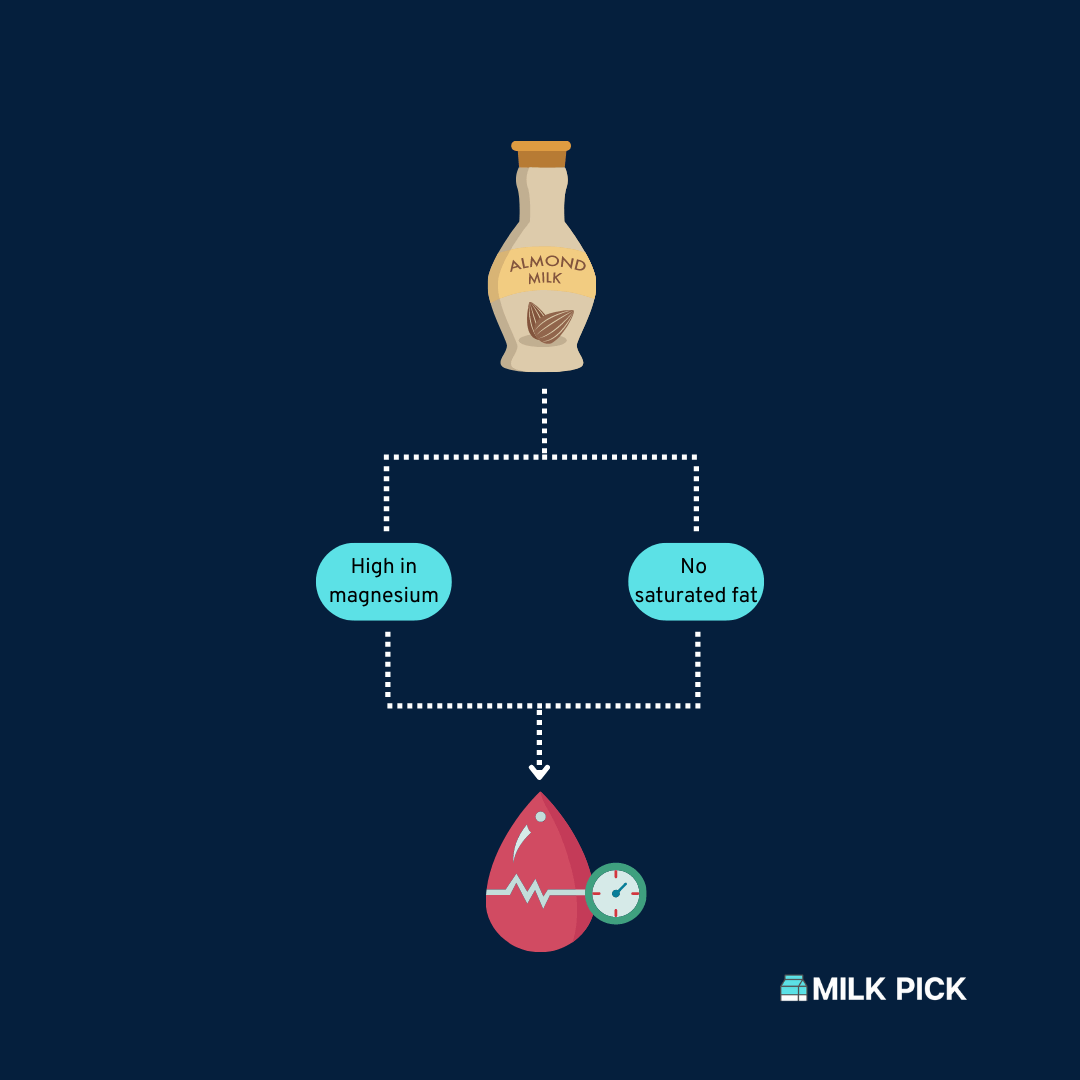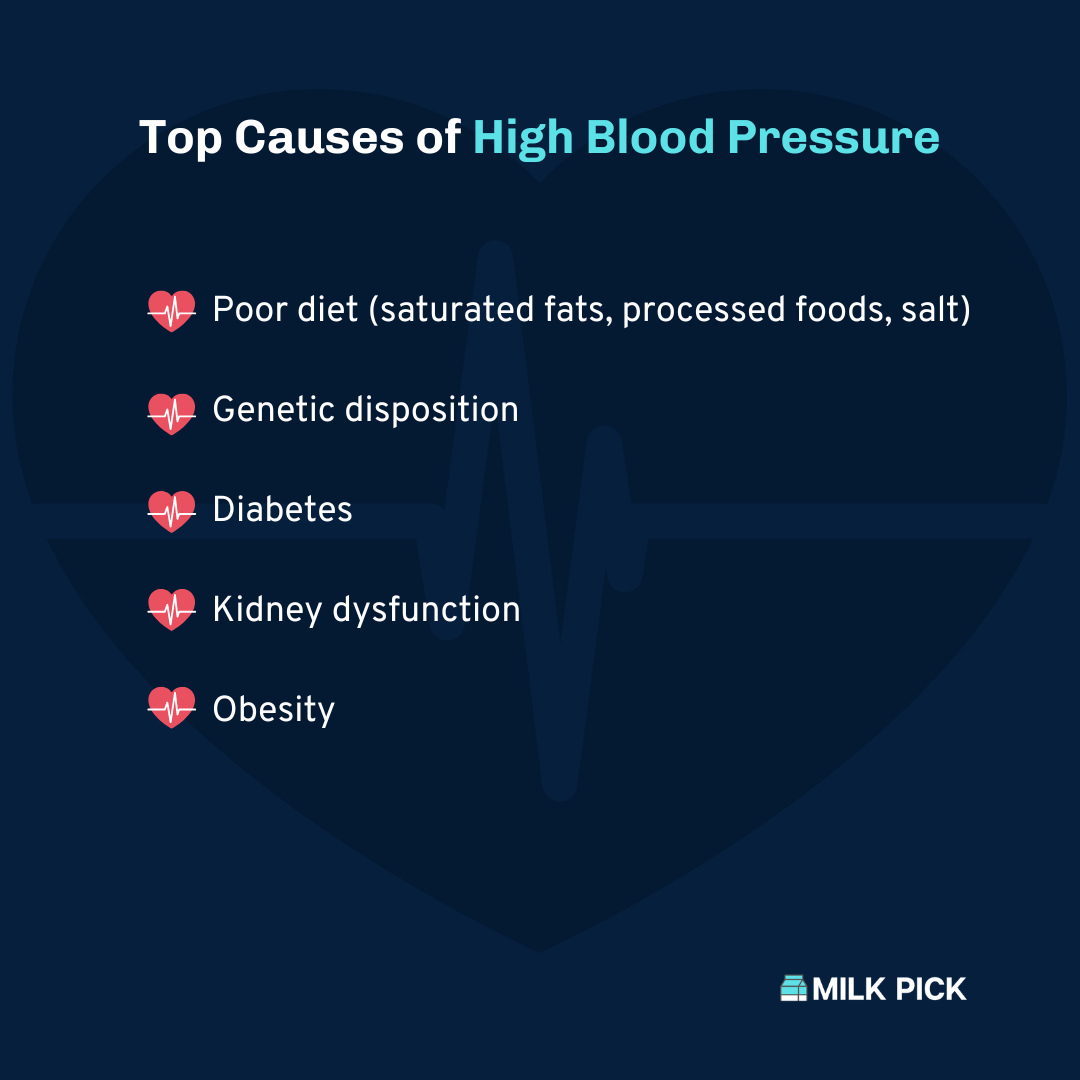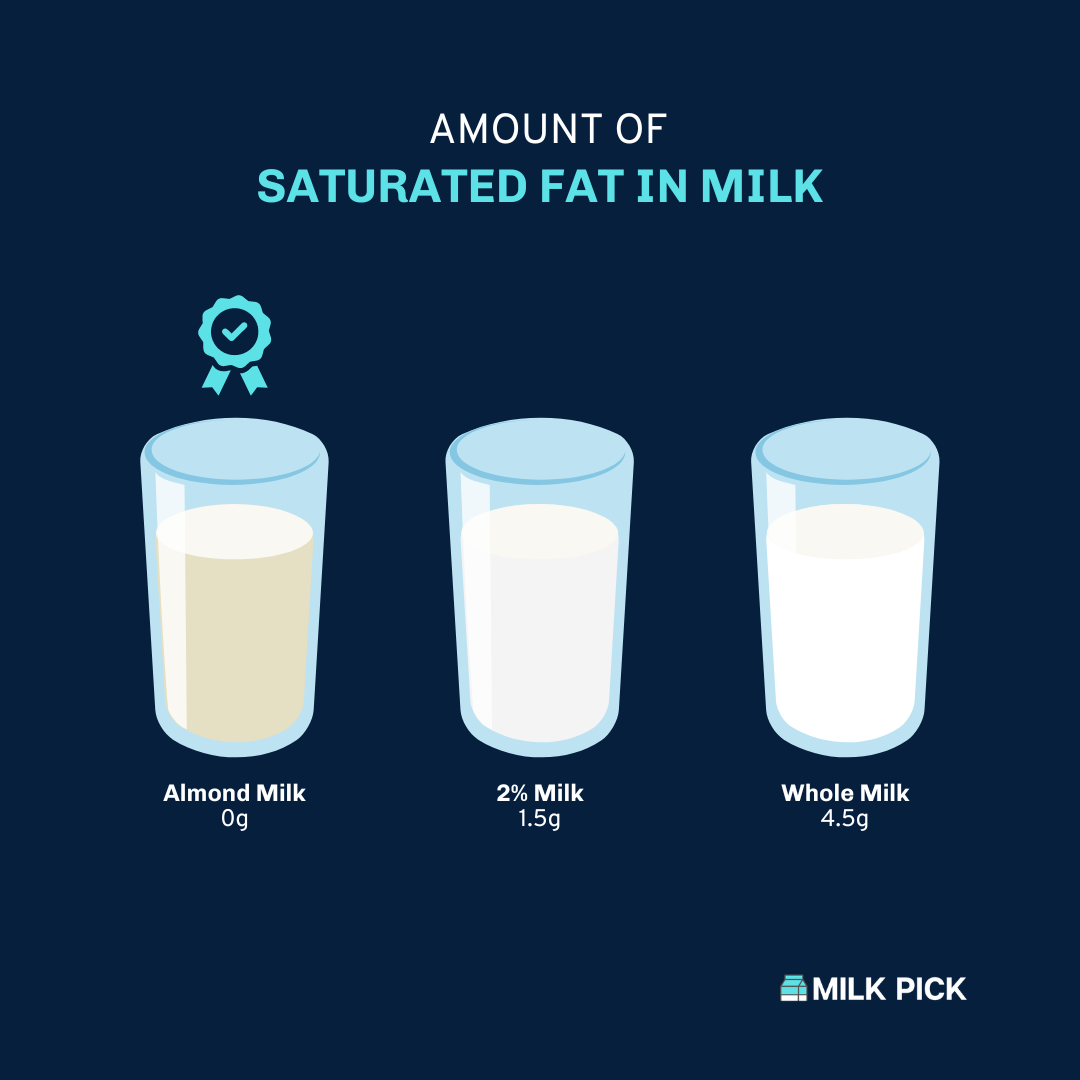If you’ve been diagnosed with high blood pressure, it might be time to take a hard look at the dietary choices you make on a daily basis.
When it comes to your choice of milk, you might wonder if almond milk is good for high blood pressure.
Almond milk is a great choice for reducing high blood pressure because it’s low in saturated fats. This helps lower the amount of harmful cholesterol in your body while simultaneously dilating your vessels for a healthy cardiovascular system.
This article will do a deep dive into why almond milk can help lower your high blood pressure. We’ll also touch on how to know which almond milk at the grocery store will help your blood pressure.
How Does Almond Milk Lower Blood Pressure?
Almond milk has no saturated fats and is rich in heart-healthy nutrients, which makes it a good option for people with high blood pressure.
Saturated fats have been shown to increase your low-density lipoproteins, otherwise known as your “bad cholesterol.”
When this type of cholesterol increases, it clogs up your arteries making your heart pump harder against more resistance resulting in high blood pressure.
Since almond milk doesn’t have saturated fats, you won’t be increasing the type of cholesterol that clogs up your arteries.

What Exactly is High Blood Pressure?
Having less plaque in our bloodstream to help improve blood flow sounds great, right? But you might be wondering why this helps your blood pressure.
To make better sense of this, let’s start by better understanding what your blood pressure is.
Your blood pressure measures the amount of pressure your heart creates to pump blood throughout your body.
It’s more or less a measure of how hard your heart is working at a given point in time. This is why things like exercise or stress temporarily increase your blood pressure.
High blood pressure becomes a problem when the heart is working on overdrive.
The pressure tends to stay too high for too long, indicating that there is some resistance in the system.
These are the guidelines from the CDC for healthy and unhealthy blood pressure readings.
Blood Pressure Category | Systolic (Top Number) | Diastolic (Bottom Number) |
|---|---|---|
Normal | Less than 120 | Less than 80 |
Elevated | 120-129 | Less than 80 |
State 1 Hypertension | 130-139 | 80-89 |
Stage 2 Hypertension | Greater than 140 | Greater than 90 |
What Causes High Blood Pressure?
High blood pressure is what we call a multi-factorial disease. This means that there is not just one thing that causes it to happen.
Factors that cause high blood pressure include:
- Diets high in saturated fats and salt
- Genetic predisposition
- Diabetes
- Kidney dysfunction
- Obesity
While almond milk obviously can’t address all of these factors, there is strong evidence indicating that refining your diet with heart-healthy options can be a powerful tool for helping lower your blood pressure.
However, it’s important to consult with your doctor regarding the factors contributing to your high blood pressure to ensure that your treatment plan is tailored to meet your needs.

Why Do We Care About Saturated Fats?
One of the main ways you can start to change your diet to help lower your blood pressure is to reduce the amount of saturated fat you consume.
Saturated fats have been strongly correlated to increasing your risk of developing high blood pressure in individuals of all backgrounds. As we discussed earlier, this is because saturated fats increase the amount of bad cholesterol circulating in your vessels.
Interestingly, research has shown children with a strong family history of high blood pressure who adopt a diet low in saturated fat from infancy are far less likely to develop hypertension.
With almond milk lacking saturated fat, it makes for a wonderful milk alternative for helping to lower your overall dietary saturated fat.
Related: Is Almond Milk Good For Cholesterol?
Traditional Cow-Milk and High Blood Pressure
If you are weary of leaving behind your cow milk, that’s totally understandable. However, the data regarding the influence of traditional cow milk and high blood pressure is rather convincing.
Studies have shown that the more dairy products you consume, the higher your risk of developing high blood pressure.
To give you an idea of the amount of saturated fat in cow milk, an 8-ounce glass of whole milk has 4.5 grams of saturated fat. The same 8-ounce glass of almond milk that is unsweetened has absolutely no saturated fat.
If you can’t bear to part ways with traditional cow milk, opt for low-fat or skim milk to minimize the impact on your overall heart health. Just make sure it doesn’t contain any added sugar or sweeteners.

Is All Almond Milk Good For Lowering Your Blood Pressure?
While most almond milk will be lower in saturated fats than traditional cow milk, there is one ingredient you have to watch out for that could increase your blood pressure.
This potentially dangerous ingredient is the ever-famous added sugar often found in commercial variations of almond milk.
To understand sugar’s effect on your blood pressure, we need to revisit our friend nitric oxide.
Unfortunately, sugar reduces the production of nitric oxide. This leads to more constricted blood vessels and consequently raises your blood pressure.
Will the Amount of Sugar in Sweetened Almond Milk Impact Your Blood Pressure?
While no one can answer this with 100% certainty, we have to look at general dietary guidelines to make an educated guess.
There are no hard guidelines for daily sugar consumption, but the American Heart Association has some rough guidelines to optimize your heart health.
They suggest that women consume no more than 24 grams of sugar per day and men consume no more than 36 grams per day.
At first glance, that sounds like a lot of sugar, but it turns out that some forms of sweetened almond milk contain close to that amount in one glass.
One serving of unflavored sweetened almond milk contains an average of 17 grams of sugar.
If the sweetened almond milk has flavoring like vanilla or chocolate, it may contain up to 22 grams of sugar per serving.
Based on those numbers, it’s safe to say that when it comes to lowering your blood pressure, you will want to opt for an unsweetened variation of almond milk.
Almond Milk Won't Cure High Blood Pressure, But it Helps
When it comes to choosing milk to help your high blood pressure, almond milk is a great pick.
The lack of saturated fats optimizes blood flow in your vessels to lower your blood pressure.
Traditional cow milk is typically not the best choice to lower your blood pressure as it tends to be high in saturated fats.
These saturated fats form plaque, which can clog your blood vessels and consequently increase your blood pressure.
While almond milk will generally be a better choice than traditional cow-milk for lowering your blood pressure, you want to be sure to opt for an unsweetened variation of almond milk.
Remember that the sugar in sweetened almond milk can potentially mitigate the benefits of almond milk for your blood pressure.
With a simple dietary switch to almond milk, you are one step closer to lowering your blood pressure and living a healthier heart!
